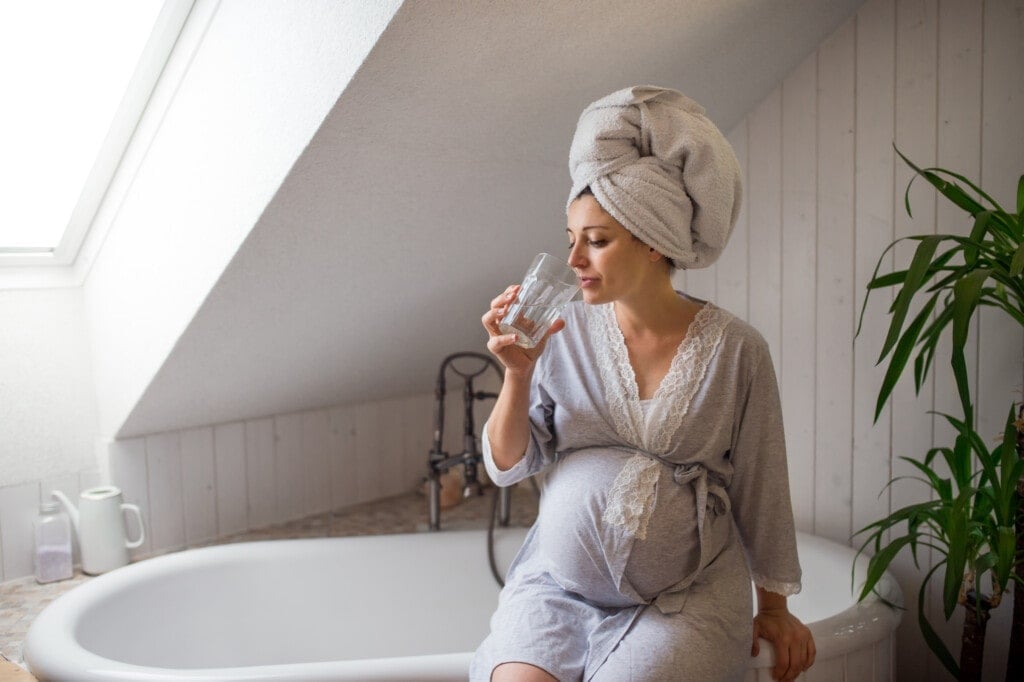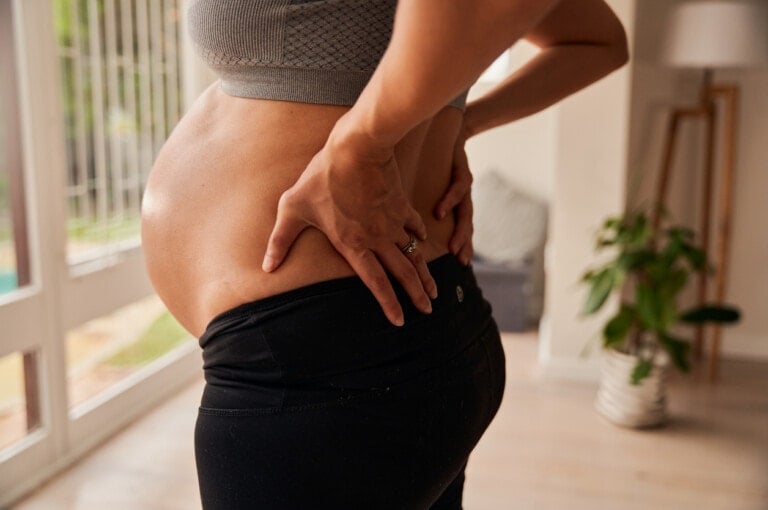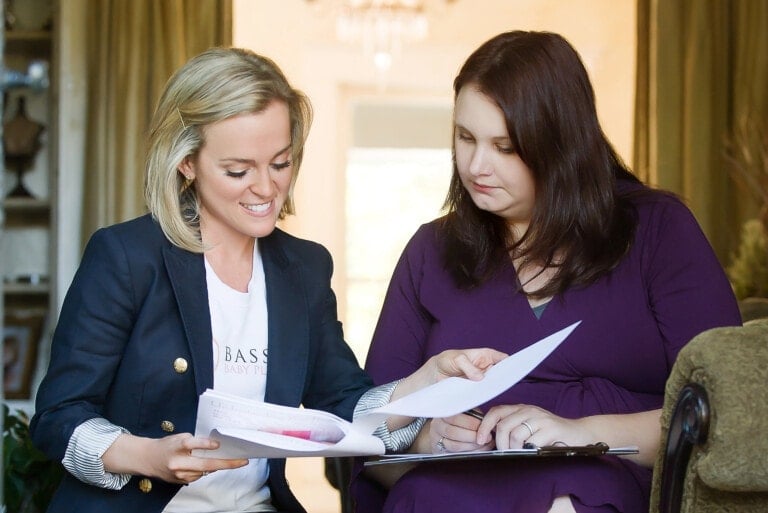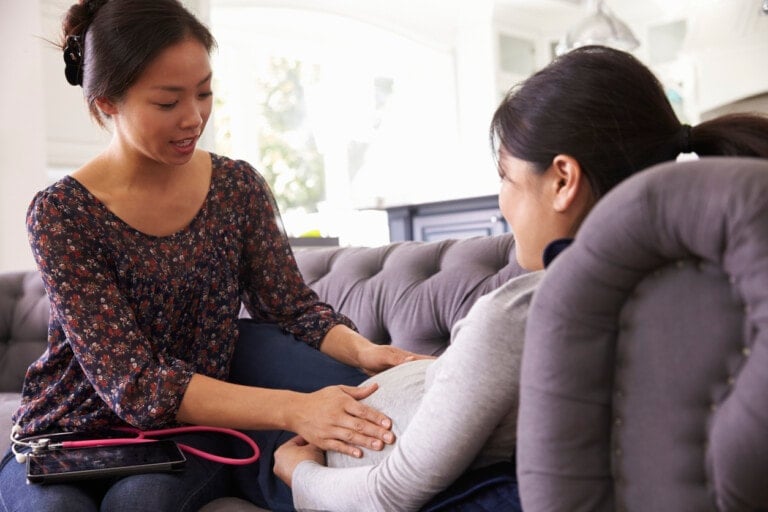When pregnant with my daughters, I always felt the most pain and fatigue in my lower back. Taking a warm bath with Epsom salts was a great way to release muscle tension and ease my mind and body. I loved taking a warm bath once a week, usually on a Thursday or Friday evening at the end of a long work week or after I had finished a gentle workout.
But—you may ask—can you even take a bath when you’re pregnant?
The answer is yes! However, you need to take a few precautions, namely, that your bath’s temperature isn’t too hot and that you aren’t adding toxic chemicals or irritants to the bathwater.
Tips for Taking a Bath While Pregnant
Here’s what you need to know about taking a bath while pregnant.
Temperature
A body temperature over 101 degrees Fahrenheit can be concerning in pregnancy, especially for extended periods in early pregnancy. Sitting in a hot bathtub with a water temperature of at least 104 degrees Fahrenheit, it only takes 10 minutes for your body temperature to increase to 102.2 degrees Fahrenheit, a potentially unsafe temperature.
For this reason, you want to keep your bathwater between 98.6 and 100 degrees Fahrenheit. You can use a thermometer or child’s bathtub thermometer (this will conveniently float in the water, and you can use it again once your baby is born and you start him on his baths!) to monitor the water temperature. Bottom line: keep your bathwater between 98.6 and 100 degrees during pregnancy.
Why is hot water dangerous?
Hot water may be dangerous when pregnant because it can raise your body temperature past a healthy level. This can lead to hyperthermia or overheating. Hyperthermia causes a drop in blood pressure, which may reduce blood flow to your baby and can deprive your baby of essential nutrients and oxygen. Some studies have linked hot baths and saunas or hot tubs early in pregnancy with birth defects, including spina bifida.1
Get out of the bath if you experience any of the following symptoms:
- Sweating
- Nausea
- Dizziness
- Feeling hot
- Discomfort
- Itchy
If you notice you are sweating profusely, immediately remove yourself from the bath, splash yourself with cold water, and drink plenty of water to cool down.
Stay hydrated!
Remember to drink plenty of water before and after your bath because the heat from the warm bath causes you to sweat and lose fluids.
What can I add?
It’s safe to add bath salt to your warm or tepid bath to help ease pregnancy-induced aches and pains, alleviate symptoms of hemorrhoids, and reduce overall stress. Add two cups of bath salt to your bathwater and dissolve it, swirling it around with your hand before soaking in it for about 10-15 minutes. Read the back of the label to ensure your bath salts are free of toxic chemicals or added fragrances. We love Pink Stork Pregnancy Flakes Dead Sea Salt, and Dr. Teal’s Eucalyptus and Spearmint bath salts.
Organic bath products free of toxic chemicals are okay, but ideally, you should not add anything other than bath salt or oatmeal. Lighting a candle, playing soft music, or using aromatherapy outside the tub, like vanilla and lavender scents, are great ways to promote relaxation while you unwind in the bathtub.
What shouldn’t I add?
Avoid bubbles, bath bombs, and special oils that can disrupt the natural acidic balance of your vagina, leading to a yeast infection. Not only are yeast infections uncomfortable, but the medications used to treat yeast infections aren’t always safe to take during pregnancy. Do not add any products that contain phthalates or sulfates.
Alternatives to baths.
Try gentle swimming at your local pool if you’re not a fan of bathing while pregnant but love to be in the water. Some gyms offer prenatal swimming classes for moms-to-be. Another alternative is Epsom salt foot baths, which are easy to set up at home. Fill a plastic bucket or container with tepid or warm water, add Epsom salt or oatmeal, sit in your favorite chair or on the couch, and soak! Additionally, prenatal massages can be an excellent way to ease muscle tension and promote relaxation.
How long can I stay in the bath?
Your bath shouldn’t be longer than 10-15 minutes. Hyperthermia may occur if you stay in hot water for an extended time. This condition is when your body temperature becomes abnormally high, which is unhealthy for your body.
A warm bath is not the same as a hot tub because hot tubs have a higher temperature and are more prone to germs. Hot tubs and jacuzzis consist of recycled water flowing at a higher temperature.
In one study, medical researchers found an increased risk of birth defects such as esophageal atresia, omphalocele, and gastroschisis in women who use hot tubs more than once during early pregnancy and for long periods.1
Be careful not to slip!
Getting out of the bath is a time to take it slow and use precautions. Ensure you have non-slip bath mats installed inside the tub and on the floor when you step out. Rubber bottom rugs are recommended if you want something soft to step onto. You may want to install a wall support or something solid to hold onto when you enter and exit the bath or ask for assistance from your partner.
After-bath care
After a bath, step into a soft, luxurious towel or robe. Moisturize your skin with organic lotion or oil. Make sure to drink plenty of water to stay hydrated, and feel free to follow your soothing bath with a nice, cozy sleep, giving you and your baby time to rest and grow.
Following these easy tips means safely taking a bath while pregnant and enjoying every blissful minute! Contact your medical provider if you have questions or concerns about bathing while pregnant.
































